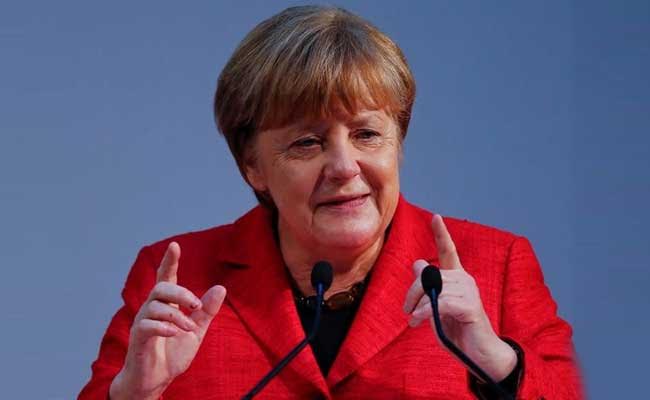Germany’s economy is probably strong enough to shrug off the country’s dive into political uncertainty for now.
The collapse of coalition talks has cast a shadow over Chancellor Angela Merkel’s ability to provide stable leadership for Europe’s most powerful nation, just as the region seeks stronger integration. Yet the turmoil in the capital of Berlin is doing little to worry economists watching the country as a whole benefit from record-low joblessness and booming output.

“The economy is in such good shape with 2.5 percent growth, strong business confidence, full employment and a fiscal surplus that few major decisions need to be taken for the time being,” said Holger Schmieding, chief economist at Berenberg. “Businesses will not curtail investment growth by much, growth can rumble even in a political limbo.”
Germany’s unemployment rate was 5.6 percent last month, the lowest since reunification a quarter of a century ago. Economic growth of 0.8 percent last quarter beat estimates and was led by exports and investment, supporting solid domestic consumption and showing that the expansion is resilient. The Ifo institute’s gauge of business confidence is at a record high.
Bundesbank President Jens Weidmann said last week that growth is “impressive, especially against the background of high political uncertainty globally,” and the German central bank said in a report on Monday that the strong upturn should continue in the fourth quarter.
Bloomberg Economics lifted its projections last week, arguing that growth is only likely to slow once the country’s employment boom and strong migration flows end.
Still, one broader risk is that whatever path Merkel and her Christian Democrats take next — restarting attempts to form a coalition, forging ahead with a minority government, or calling new elections — she may find herself too focused on domestic affairs to pay much attention to Europe’s challenges. That’s a threat to the pursuit of an ambitious reform agenda with French President Emmanuel Macron and could complicate negotiations over the U.K.’s withdrawal from the European Union.
Europe’s recovery isn’t threatened in the short term “but the absence of political outlook isn’t good,” said Ludovic Subran, chief economist at Euler Hermes in Paris. “It puts at risk Europe’s window of opportunity.”
Merkel had attempted to form a coalition with the Free Democrats — whose walkout on Sunday ended a month of talks — and the Greens. Forming a minority government instead would be less than ideal, according to Joerg Kraemer, chief economist at Commerzbank AG in Frankfurt.
“First, one should not expect a clear political course,” he said. “Secondly, a minority government would have to offer expensive compromises to ‘buy’ the consent of the other parties. This would boost public spending which reduces the funds available for sorely needed investments.”
Kraemer added that a grand coalition with the Social Democrats — which that party has, in any case, ruled out — could also be a problem because of its pledge to roll back previous labor-market reforms.
Nordea Markets says the most plausible scenario is new elections and a Merkel-led coalition, with a grand bargain now more likely. The bank also says that while it’s considering an upward revision to its growth forecast of 1.8 percent next year, the breakdown in talks has given it pause.
“This is uncharted territory for Germany, nothing can be taken for granted right now,” said Holger Sandte, chief European analyst at Nordea in Copenhagen. “But I think the impact on investment and the economy will be small, maybe invisible.”







